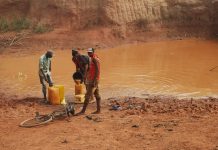By sani Zaria
The AGRA-NAERLS Kaduna Consortium Project Secondary School Agroforestry Project aims to promote sustainable farming
practices among smallholder
farmers in Likoro Community of
Kudan Local Government
Area.
The project focuses on
implementing ecosystem-
friendly measures to combat
soil erosion and crop lodging
caused by high wind speed.
Through these demonstrations, Agricultural Green Revolution in Africa Kaduna Consortium aims to promote sustainable and resilient agricultural practices that can empower farmers to combat the effects of climate change and enhance agricultural productivity in the region.
The strategic planting of windbreak trees target farm boundaries and intercropping compatible tree and crop species, the agroforestry system offers innovative solutions.
Indigenous tree species like Parkia
biglobosa and fruit trees, such as Mango, are being incorporated into the farmers’ cropping system.
This diversification not only helps mitigate the negative effects of wind on soils and crops but also creates additional income streams for farmers.
They encouraged farmers to plant fruit trees like Mango around their homes, the project seeks to provide thermal comfort and resilience against harsh weather conditions for the local communities.
The overall objective is to enhance agricultural productivity while fos-
tering environmental sustainability and improved livelihoods for the
participating farmers.
“Joint AGRA Kaduna Consortium and OFPSAN Organic Fertilizers Application Demonstration”.
The AGRA Kaduna Consortium, in collaboration with the Organic Fertilizer Producers Association of Nigeria (OFPSAN), conducted organic fertilizer application demonstrations at two locations in Kaduna State: NAERLS Headquarters Demo Sites in Sabon-Gari and Kudan Local Government Areas.
Recognizing the challenges posed
by climate change, including in-
creased drought and low crop
yields (maize, rice, soybean, cow-
pea and tomatoes), smallholder
farmers in rural areas are experi-
encing reduced income and
heightened food insecurity.
In response to these difficulties, the project explored the use of organic fertilizers to enhance soil quality and fertility.
Certified organic fertilizers from AAC Miracle Feeders, BUMA Resource, AMSAJ, and EXCEL Standard (OFPSAN members) were utilized in the demonstrations, offering immediate benefits to crops by improving soil structure, providing essential nutrients, increasing water-holding capacity, and controlling underground insects and pests.
Organic modifications like animal manure, compost, and bio-wastes were also employed to regenerate the soil.
The adoption of organic fertilizers is expected to enable smallholder
farmers to increase productivity and minimize environmental chal-
lenges.
The project highlights the significance of climate-smart
and regenerative agricultural practices, emphasizing their poten-
tial to sequester carbon in soil and aboveground biomass, contributing to the reversal of atmospheric carbon accumulation.



















